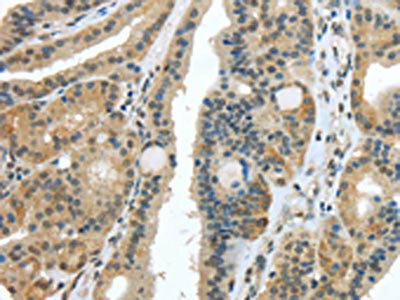Description
| Antibody Name: | USP28 Antibody (PACO20842) |
| Antibody SKU: | PACO20842 |
| Size: | 50ul |
| Host Species: | Rabbit |
| Tested Applications: | ELISA, IHC |
| Recommended Dilutions: | ELISA:1:2000-1:5000, IHC:1:25-1:100 |
| Species Reactivity: | Human, Mouse, Rat |
| Immunogen: | Synthetic peptide of human USP28 |
| Form: | Liquid |
| Storage Buffer: | -20°C, pH7.4 PBS, 0.05% NaN3, 40% Glycerol |
| Purification Method: | Antigen affinity purification |
| Clonality: | Polyclonal |
| Isotype: | IgG |
| Conjugate: | Non-conjugated |
 | The image on the left is immunohistochemistry of paraffin-embedded Human thyroid cancer tissue using PACO20842(USP28 Antibody) at dilution 1/35, on the right is treated with synthetic peptide. (Original magnification: x200). |
| Background: | The ubiquitin-dependent protein degradation pathway is essential for proteolysis of intracellular proteins and peptides. Enzymes that remove ubiquitin from ubiquitin-conjugated peptides, like USP28, affect the fate and degradation of intracellular proteins and are essential for maintenance of cell-free ubiquitin pools (Valero et al., 2001). |
| Synonyms: | ubiquitin specific peptidase 28 |
| UniProt Protein Function: | USP28: a peptidase of the C19 family. USP28 and FBXW7 regulate Myc protein stability in response to DNA damage. Two isoforms of the human protein are produced by alternative splicing. |
| UniProt Protein Details: | Protein type:EC 3.4.19.12; Protease; Ubiquitin-specific protease Chromosomal Location of Human Ortholog: 11q23.2 Cellular Component: nuclear body; nucleoplasm; protein complex Molecular Function:protein binding; ubiquitin-specific protease activity Biological Process: cell proliferation; DNA damage checkpoint; DNA damage response, signal transduction by p53 class mediator resulting in induction of apoptosis; protein deubiquitination; Ras protein signal transduction; regulation of protein stability; response to DNA damage stimulus; response to ionizing radiation |
| NCBI Summary: | The protein encoded by this gene is a deubiquitinase involved in the DNA damage pathway and DNA damage-induced apoptosis. Overexpression of this gene is seen in several cancers. [provided by RefSeq, Oct 2016] |
| UniProt Code: | Q96RU2 |
| NCBI GenInfo Identifier: | 20140700 |
| NCBI Gene ID: | 57646 |
| NCBI Accession: | Q96RU2.1 |
| UniProt Secondary Accession: | Q96RU2,Q6NZX9, Q9P213, B0YJC0, B0YJC1, |
| UniProt Related Accession: | Q96RU2 |
| Molecular Weight: | 122kDa |
| NCBI Full Name: | Ubiquitin carboxyl-terminal hydrolase 28 |
| NCBI Synonym Full Names: | ubiquitin specific peptidase 28 |
| NCBI Official Symbol: | USP28 |
| NCBI Protein Information: | ubiquitin carboxyl-terminal hydrolase 28 |
| UniProt Protein Name: | Ubiquitin carboxyl-terminal hydrolase 28 |
| UniProt Synonym Protein Names: | Deubiquitinating enzyme 28; Ubiquitin thioesterase 28; Ubiquitin-specific-processing protease 28 |
| Protein Family: | Ubiquitin carboxyl-terminal hydrolase |
| UniProt Gene Name: | USP28 |






